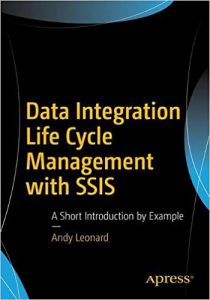You might need an SSIS framework. “How can I tell if I need an SSIS framework, Andy?” I’m glad you asked.
Does your enterprise:
- Practice DevOps?
- Execute lots of SQL Server Integration Services (SSIS) packages?
- Execute SSIS packages several times per day?
- Execute “SSIS in the Cloud” using the Azure Data Factory version 2 Integration Runtime (ADFv2 IR)?
- Require configuration options not available in off-the-shelf solutions?
How an SSIS Framework Can Help
One SSIS best practice is to develop small, unit-of-work packages. You can think of them as data engineering functions. Design SSIS packages with the fewest number of Data Flow Tasks, optimally one.
There’s a saying in engineering (and life): “There’s no free lunch.” Applied to data engineering with SSIS, if you apply the best practice of creating small, unit-of-work packages, you end up with a bunch of SSIS packages. How do you manage executing all these packages? An SSIS framework.
An SSIS framework manages package execution, configuration, and logging.
SSIS Framework Community Edition
The SSIS Framework Community Edition is part of the DILM (Data Integration Lifecycle Management) Suite. SSIS Framework Community Edition groups the execution of several SSIS packages into SSIS Applications, which are a collection of SSIS packages configured to execute in a specific order.
“Can’t I just use Execute Package Tasks for that, Andy?”
Yes. And no. When deploying to the SSIS Catalog, the Execute Package Task can be used to execute any package as long as that package exists in the same project. What if you have a utility package – say a package that archives flat files after you’ve loaded them – that you want to store in a single SSIS Catalog folder and project but call from different processes (or SSIS applications)? SSIS Framework Community Edition can execute that package as part of an SSIS application.
SSIS Framework Community Edition is Catalog-Integrated
SSIS Framework Community Edition is integrated into the SSIS Catalog. When packages execute as part of an SSIS application, operational metadata and execution information is sent to the SSIS Catalog’s tables. You can view operational metrics and metadata using the catalog reports solution built into SQL Server Management Studio (SSMS)…
…or you could view SSIS execution logs and operational metadata using Catalog Reports – a free and open-source SQL Server Reporting Services (SSRS) solution from DILM Suite.
SSIS Framework Community Edition is Free. And Open-Source.
SSIS Framework Community Edition is free and open-source. In fact, the documentation walks you through building your own SSIS framework – it teaches you how you would design your own SSIS framework.
SSIS Framework Community Edition is Customize-able
Customization is one of the coolest features of open-source software. If you need some unique functionality, you have the source code and can code it up yourself!
If you don’t have time to code your own unique functionality, Enterprise Data & Analytics can help. It’s possible SSIS Framework Commercial or Enterprise Edition already has the functionality you seek. Compare editions to learn more.
SSIS Framework Community Edition is Cloud-Ready
I can hear you thinking, “Wait. It’s free. It’s open-source. And it runs in the cloud?” Yep, yep, and yep!
We Can Help
At Enterprise Data & Analytics, we’ve been building data integration frameworks for over 15 years. I wrote a book about Data Integration Lifecycle Management (DILM):
We built the DILM Suite– a collection of utilities and solutions, many of which are free (and some even open-source!):
We grok frameworks.
Learn more at Enterprise Data & Analytics.




Comments